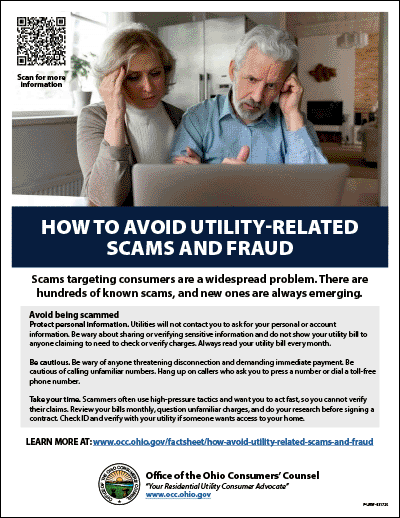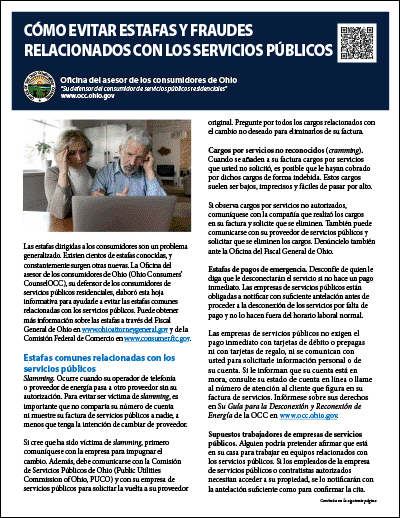How to Avoid Utility-Related Scams and Fraud
 Scams targeting consumers are a widespread problem. There are hundreds of known scams, and new ones are always emerging. The Office of the Ohio Consumers’ Counsel (OCC) has developed this fact sheet to help you avoid common utility scams. More information about scams can be obtained from the Ohio Attorney General at www.ohioattorneygeneral.gov and the Federal Trade Commission at www.consumer.ftc.gov.
Scams targeting consumers are a widespread problem. There are hundreds of known scams, and new ones are always emerging. The Office of the Ohio Consumers’ Counsel (OCC) has developed this fact sheet to help you avoid common utility scams. More information about scams can be obtained from the Ohio Attorney General at www.ohioattorneygeneral.gov and the Federal Trade Commission at www.consumer.ftc.gov.
Common utility-related scams
Slamming. This occurs when your energy provider or telephone carrier is switched to another provider without your authorization. To avoid being slammed, it is important not to share your account number or show your utility bill to anyone unless you are intending to switch providers.
If you think you have been slammed, first contact the company to challenge the change. Then, you should also contact the Public Utilities Commission of Ohio (PUCO) and your utility and ask to be returned to your original provider. Ask for all charges related to the unwanted switch to be removed from your bill.
Cramming. When charges for services are added to your bill that you did not order, you may have been crammed. These charges are often small, vague, and easy to overlook.
If you see charges for unauthorized services, contact the company that placed the charges on your bill and ask that they be removed. Also, contact your utility and ask that the charges be removed. Also report it to Ohio Attorney General’s Office.

Emergency payment scams. Beware of anyone claiming you will be disconnected if you do not pay immediately. Utilities are required to provide prior notice well before services can be disconnected for non-payment and do not disconnect service outside normal business hours.
Utility companies do not require immediate payment by prepaid debit card or gift card or contact you for personal or account information. If you are told your account is past due, check its status online or call the customer service number listed on your utility bill. Learn about your rights from OCC’s Your Guide to Energy Disconnection and Reconnection at www.occ.ohio.gov.
Utility worker imposters. Someone may claim to be at your home to work on utility-related equipment. If utility employees or authorized contractors need to access your property, you will be notified in advance with time to confirm the appointment.
After widespread power outages, a scammer may offer to restore power for an upfront fee. Utilities do not require payment to restore service after a natural disaster or related outages.
False refunds or discounts. You may be promised refunds, free products, or services. Check these claims before providing any information or allowing a stranger into your home. If an overpayment has occurred, your account will be credited without any need to provide or verify personal or account information.
Caller ID spoofing. “Spoofing” technology can be used to change the readout appearing on caller ID. It is important to be cautious even if it looks like your utility company is calling you. If you are unsure, contact your utility with the number found on your bill.
Door-to-door. Scammers posing as utility representatives have been reported. Always ask to see a photo ID and verify with the company before allowing anyone to enter your home. Be cautious about sharing any personal information, including utility bills.
Solar Scams. Solar scams are on the rise. Scammers often claim to be with your electric utility and offer free solar panels or other benefits. Do not feel pressured to make any immediate decisions. Always research the company and the claims.
Avoid being scammed

Protect personal information. Utilities will not contact you to ask for your personal or account information. Be wary about sharing or verifying sensitive information and do not show your utility bill to anyone claiming to need to check or verify charges.
Be cautious. Be wary of allowing an unknown person into your home. Be cautious of calling unfamiliar numbers. Hang up on callers who ask you to press a number or dial a toll-free phone number.
Take your time. Scammers often use high-pressure tactics and want you to act fast, so you cannot verify their claims. Review your bills monthly, question unfamiliar charges, and do your research before signing a contract.
Report scams
If you suspect fraud, contact local law enforcement. The Attorney General’s Office can also address utility scams. Call 1-800-282-0515 or complete their online complaint form at www.ohioattorneygeneral.gov.
Direct questions and complaints about utility services, including scams, to the PUCO. File informal complaints via their online complaint form at www.puco.ohio.gov, or call 1-800-686-7826.
More information
More information regarding utility scams can be found in the Utilities United Against Scams Guide to Utility Scams.
To download: Click the folder with a down arrow icon. To print: Click the printer icon in the top right of the display.
If you need multiple copies for an organization or group, please contact a member of our outreach team.
